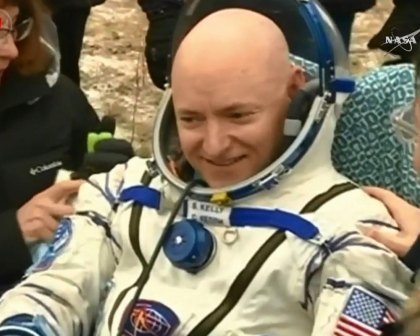Year in space leaves astronaut sore, tired

Astronaut Scott Kelly returned from the space station.
Photo: NASA.
Kelly, 52, along with Russian cosmonaut Mikhail Kornienko, 55, spent a year at the International Space Station as part of a research project focusing on the effects of spaceflight on humans. They returned March 2.
During his first press conference since the flight ended, Kelly talked on March 4 about the physical challenges of being back on Earth after a year in space. He recalled that this was not his first long-term spaceflight. He spent six months at the station in 2010-11.
This time, Kelly says, he felt better when emerging from the Soyuz capsule – the Russian-operated craft that takes crews to and from the station. “But at some point, those two lines have crossed and my level of muscle soreness and fatigue is a lot higher than it was last time.”
Asked which muscles groups were hurting, he said “most of them.” He has also experienced joint pain. Other issues:
- Skin: “It’s very, very sensitive," he says. "It’s almost like a burning feeling, wherever I sit or lie or walk.”
- Vision: He experienced vision changes in space. “In the beginning you notice some changes,” he said, but then it levels off.
- Height: In space, Kelly might have been slightly taller, said John Charles, human research program associate manager for international science at NASA. Charles explained why: "As we all sit here on the ground or stand here on the ground, our backs are being compressed. You can often feel that, especially at the end of a long day, your back is tight and sore. Part of that is signalling the fact that the discs that cushion between each of the vertebral bones in your back get compressed by the weight of the body above them. Now, in the absence of gravity, they (the bones) have a certain natural resilience. They bounce back. They spring up and they absorb body fluids. So during the time that astronauts are in space, they do get a little bit taller." But he says that once they return, their height is again impacted by gravity.
Charles said concerns about long-term spaceflight include the impact of radiation on the body, the need for autonomous medical care, the need for fresh food and the psychological impact of being in space. One year is a long time to spend away from Earth and family. During Kelly’s six-month spaceflight in 2011, his sister-in-law, U.S. Rep. Gabrielle Giffords, D-Ariz., was gravely wounded in an assassination attempt.
“I wouldn’t characterize it as feeling homesick,” he recalls, “but certainly, you know, you feel like you want to be there.”
This time, Kelly marked the longer stay with milestones. “When is the next crew arriving? When is the next visiting vehicle arriving?”
In between, there were stressful moments. From October 2014 to June 2015, three unmanned supply ships (one Russian, two from American companies) failed to make it to the station. Kelly was still on the ground in October but was at the space station when the two later incidents occurred.
“We have other vehicles that can resupply us," he said. "But then when the SpaceX mishap happened (June 2015) then it was like now, the next one really has to work. … There is a plan for us to go down to reduced rations if you have to. So we all would have gotten a little skinnier.”
Space is all about risk, but Kelly doesn't mind that. "The implications of you messing things up are so severe that makes it, in my case, more rewarding. It's kind of like why I wanted to be a pilot in the Navy and land on the aircraft carrier. It's not because I thought landing on the aircraft carrier would be fun, it's because I knew that it was hard and there was risk and it was important and, for me, rewarding."
Related:
Astronaut to return with concerns for Earth
If you would like to comment give us a shout or like us on Facebook and tell us what you think.

